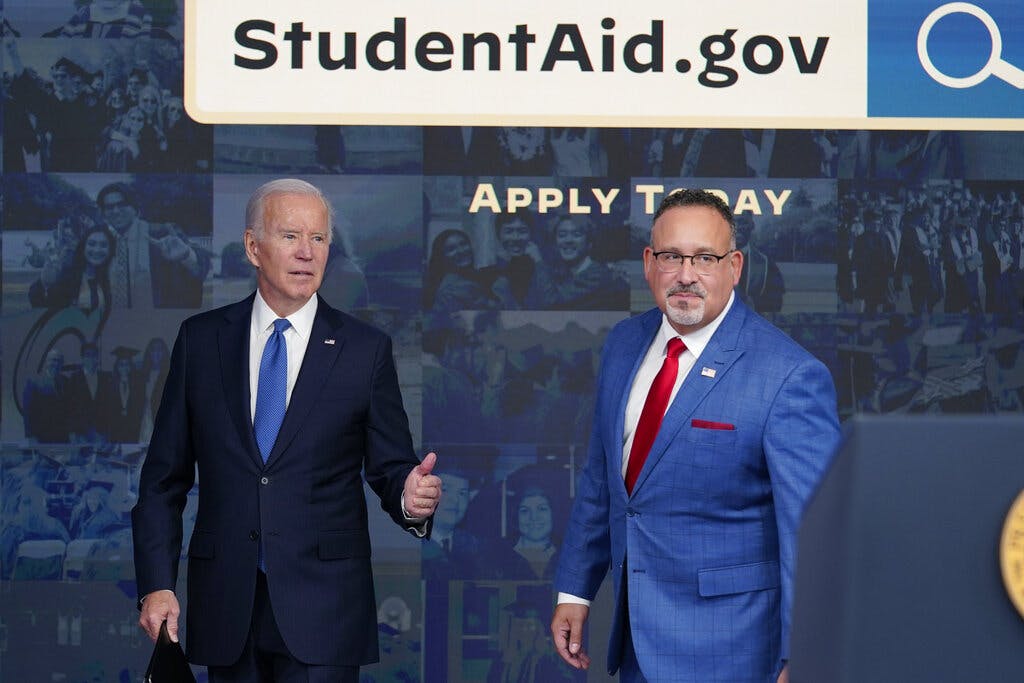Ignoring Lawsuits, Biden Forges Ahead on Student Loan Forgiveness
A beta version of the website where people can apply for the forgiveness went live on Friday, and Secretary Cardona said more than 8 million Americans applied over the weekend.

Ignoring multiple lawsuits challenging the legality of the student loan forgiveness program and protests about executive overreach, President Biden on Monday announced that his education department would begin accepting applications from borrowers seeking relief under his initiative.
Mr. Biden said the program fulfills a promise he made on the campaign trail in 2020 and will help millions of Americans recover from the “once in a lifetime pandemic.” He called critics of his initiative in Congress “hypocrites” for voting for tax cuts during the Trump era and Covid-relief handouts during the pandemic but opposing his bailout of student loan borrowers.
“Republican members of Congress and Republican governors are trying to do everything they can to deny this relief, even to their own constituents,” Mr. Biden said. “Their outrage is wrong, and it’s hypocritical.”
A beta version of the website where people can apply for the forgiveness went live on Friday, and the education secretary, Miguel Cardona, said more than 8 million Americans applied over the weekend. The website will be accepting new applications through the end of 2023, and paper applications will also become available soon.
Mr. Biden’s plan would erase up to $20,000 in student loans for some borrowers and up to $10,000 for everyone earning less than $125,000 a year.
The Congressional Budget Office has predicted that Mr. Biden’s plan, which also included an extension of the two-year-old moratorium on payments, will cost as much as $400 billion. Other independent estimates have put the cost much higher — as much as $1 trillion — when changes to the underlying student aid programs are considered along with the loan erasures.
In Monday’s announcement, Mr. Biden called his plan “life-changing” for millions of middle-income Americans. Even progressive critics of the program, however, have conceded that most of its benefits will go to upper-income, college-educated Americans. The plan, they say, amounts to a wealth transfer — to relatively well-off college graduates from working-class Americans.
Mr. Biden’s plan has been the subject of lawsuits filed by at least four plaintiffs who have challenged his authority to embark on such a spending spree without congressional authority. The administration says a 2003 law that gave the education department the right to forgive the student loans of service men and women fighting in Iraq and Afghanistan gives it the authority to proceed with the program.
One of those lawsuits has already been dismissed, but administration officials were in federal court in Saint Louis last week defending it against a challenge by six Republican-led states that want an injunction to block implementation of the program. The states claim Mr. Biden’s plan would lead to lost revenues for the states, as well as harm a student loan service provider based in Missouri. The judge, Henry Edward Autrey, told litigants that he would issue a ruling on their plea as soon as possible.
“The Biden Administration’s executive action to cancel student loan debt was not only unconstitutional, it will unfairly burden working class families and those who chose not to take out loans or have paid them off with even more economic woes,” Missouri’s attorney general, Eric Schmitt, a party to the states’ lawsuit, said. “The Biden Administration’s unlawful edict will only worsen inflation at a time when many Americans are struggling to get by.”
Asked about the legal challenges at Monday’s event, Mr. Biden said he is confident that the program will hold up in court.

